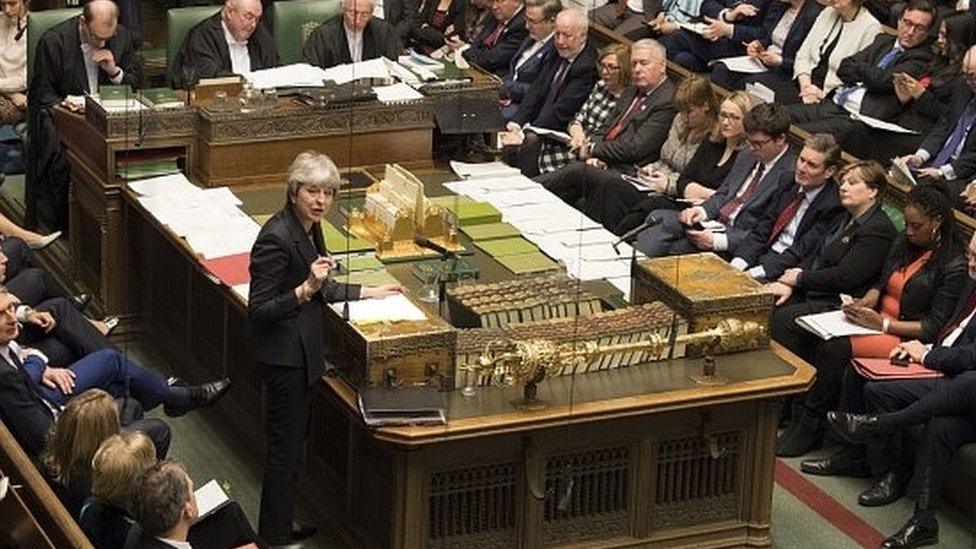Ministers 'divided' over process for testing Brexit options
- Published

Mrs May could put her deal to MPs again but, crucially, allow other options to be voted on as well
The cabinet is divided over how to handle the process of asking MPs to vote on alternative Brexit plans.
The government has promised to give the Commons the chance to vote on different versions of Brexit if the prime minister's deal is rejected again.
But the BBC's Laura Kuenssberg said it had not been decided in government whether the votes should be binding or not and what role ministers would play.
MPs believe the process can help break the current parliamentary deadlock.
It has been reported MPs could potentially consider up to six options, including remaining in the customs union and single market, a no-deal exit or cancelling Brexit, to gauge support for alternative courses of action.
Cabinet minister Greg Clark said it would be the "right step" if the prime minister's deal failed again.
He told Nick Robinson's Political Thinking podcast it was not good enough for any plan to "get over the line" and there needed to be as wide a consensus as possible behind the terms of withdrawal and the UK's future relations with the EU.
"Something that passes with a majority of one or two, I think, is not doing what we need to do which is to try to build as many people as possible together," he told Nick Robinson's Political Thinking Podcast.
In the coming days, as many as six other options, in addition to Mrs May's deal, could be voted on:
Revoking Article 50 and cancelling Brexit
Another referendum
The PM's deal plus a customs union
The PM's deal plus both a customs union and single market access
A Canada-style free trade agreement
Leaving the EU without a deal
Labour leader Jeremy Corbyn, who wants his alternative plan for a customs union and guarantees on workers rights to be among those voted on, said there was support for a different way forward.
Conservative MP Sir Oliver Letwin, who is spearheading the move with senior Labour MPs including Hilary Benn, said he believed enough MPs would back an amendment to a government motion on Monday to trigger the so-called "indicative" votes later in the week.
But Conservative Brexiteer Marcus Fysh said the idea of giving MPs a menu of options after two years of negotiations was "ludicrous and childish", while ex-minister Steve Baker said it would end in "national humiliation".
The EU has given the UK until 12 April to decide on a way forward in an attempt to break the current impasse.

How would indicative votes work?
By the BBC's parliamentary correspondent Mark D'Arcy
If the Letwin amendment passes on Monday, it could allow a rough and ready version of the "indicative votes" process MPs have been discussing for some time now.
Alongside the PM's deal, as many as six other options could be voted on, including:
revoking Article 50 and cancelling Brexit
another referendum
the PM's deal plus a customs union
the PM's deal plus both a customs union and single market membership
a Canada-style free trade agreement
leaving the EU without a deal
It is possible other options which could command reasonable levels of support might be added to the mix.
At the end all would be voted on simultaneously. MPs would fill out a ballot paper on each, voting for or against, and the relative support could then be seen.
Crucially, all the ballot-filling would be done at the same time; it would not be a case of MPs voting on one option, hearing the result, and then voting on the next. So there would be no tactical voting between options.

On Thursday, EU leaders agreed to push back the date of Brexit from 29 March until 22 May if Parliament approves the withdrawal agreement at the third time of asking.
However, they said the UK would need to come up with a plan B within three weeks if MPs throw out Mrs May's deal yet again.
Sir Oliver and Mr Benn hope that Plan B could emerge from indicative votes - with MPs effectively asked to choose from a menu of different options, to see which one gets the most backing.
MPs will debate the next steps for Brexit on Monday, as the government scrambles to persuade enough of them to back the prime minister's deal to hold another vote on it later in the week.
'Way forward'
The indicative votes would not be binding on ministers.
But they would signal the degree of support among MPs for alternative options for the UK's future relationship with the EU.
After meeting ministers on Friday, Sir Oliver said he believed those searching for a cross-party compromise "have the numbers" to guarantee indicative votes will go ahead on Wednesday.
"We are seeking to crystallise a majority in some form of proposition so we have a way forward," he said.
MPs narrowly failed in an attempt to seize control of the Parliamentary agenda earlier this month to get indicative votes on to the Commons agenda.